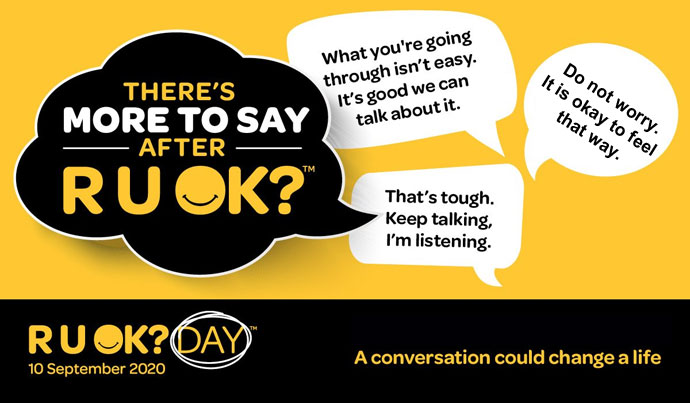With the COVID-19 pandemic grabbing hold of the world practically from the month of January itself although the spread and the related lockdowns began in March, 2020 has been a challenging year for everyone. In Australia, particularly in Victoria with second wave of COVID-19, most households have experienced extreme circumstances in one way or another. This has made it even more important for us all to stay connected and, for those who are able, be willing to support those around us and check in on them asking R U OK?
With lockdowns and curfews imposed on us, many have been living in isolation with no one to talk to or connect with.
That makes the 2020 R U OK?Day even more significant for many of us. Not all who need help may know they need help. Therefore, they may or may not say they’re not OK. In such a fragile set of circumstances, striking the conversation may actually be a life changing conversation and it is critical that we have it.
It is very important that we check in with friends and family and see if they are ok. Signs may be not easily visible and that makes it harder but at the same time more important that we check in.
There will be people who have never had any mental health issues and now suddenly find themselves landed in uncharted waters with their secure income sources having disappeared due to COVID-19 lockdowns…they may be worried for their family’s sake – suffering anxiety – perhaps on the borderline – realizing or not realizing that they need to see someone to get help…
What should be done by those who are close to such people?
“Times of adversity are calls for us to wake up and pay attention, not just to be complacent and going through the motions of life as we tend to do when things are easy. If we are paying attention, not having our faces buried in our smartphones, really listening, especially when communicating to those closest to us, we may notice subtle cues and things we might ordinarily miss. These might help us to notice that someone is under a lot of stress but does not feel easy talking about it, or that they are not wanting to burden others with their concerns. We need to stop, put everything else down, and make time to listen” said Associate Professor Craig Hassed, Senior Lecturer at the Department of General Practice, Faculty of Medicine, Nursing and Health Sciences, talking to Bharat Times.
And what should they encourage people in such situations to do?
“Be interested, ask questions and seek to understand how that person is feeling. It’s not about trying to fix them, but just giving them space to speak in an atmosphere of unconditional love and respect. Then, as the person speaks about how they are feeling they may feel greatly relieved and that is all that is needed, but it may also come to light that they need more help and support depending on how major the concerns are”, A/Professor Hassad added.
With government imposed lockdowns and curfews – the impact is right across our society with almost everyone except the top few feeling the financial crunch. And thus, A/Professor says, people “need to understand that they are not alone and it is entirely understandable to be feeling that way in the current climate.”
Concluding his advice says A/Professor Hassad, “if we engage with the challenges we face with openness, patience, compassion and courage, we will not just survive them but will also grow in wisdom as well.”
Please check in on friends and family this R U OK? Day.
Similar Posts by The Author:
- The Untold story of the ANZAC-India friendship
- VHP Australia brings Hindus together to work toward ‘growing and thriving Australia’
- Australia Post – new performance standards from 15 April
- Premier’s department fighting the release of SECRET hotel quarantine documents
- Vic Gov funds 13 programs that help international Students

